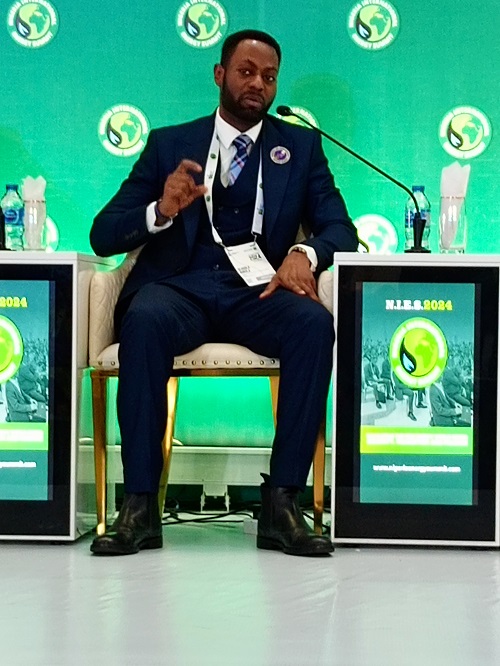Dr. Bukola Olusola, Managing Director, Matrix Energy Exploration and Production Company Limited.
Speaking in a panel session titled: African Content and Opportunities, at the Nigeria International Energy Summit (NIES), Dr. Bukola Olusola, Managing Director, Matrix Energy Exploration and Production Company Limited, said the host communities are key stakeholders to the oil and gas company and are well enlightened about its operations. He made it known that what is important for the company is to have engagement with the communities about its activities in the field and also to sustain the conversation.
Matrix Energy ensures that at every stage of operations, the company maintains relationships.
According to Dr. Olusola Matrix critically look inwards at its operations and how the company operates its assets. Development of asset is paramount and the company is intentional about it because “if we develop our asset responsibly, it will minimize our carbon footprint in the environment and enhances frequent engagement with the communities.
“Our employees are empowered and where we have the community and contractors working in any of our applications, we hold them responsible to maintain standard.”
Dr. Olusola revealed that in Matrix development strategy, the company makes sure it works with zero gas flare strategy from the beginning of its operations.
“We make sure our water is properly treated and disposed responsibly because if we minimize the impact of operations in our communities, they will see us as a responsible player.”
Another significant thing about Matrix is the fact that it treats the host community as a member of its family. “We always tell them, don’t treat us like strangers in your land but treat us as part of your family and that goes a long way to encourage them to support our operations because for every project we do, we always sit down and ask ourselves what part of our projects can we allocate to the communities because if they benefit from our projects, then we can have a sustainable operations in our communities when employees and assets are safe.”
Thus, stakeholders can maximally benefit from Matrix operations.
On the issue of gender action and implementation with sustainability and building local content, Dr. Olusola was of the view that “if you want just any idea, bring together people of similar backgrounds and life experiences, and you get just any idea.”
“But if you want a great idea, it’s an innovative product. Then you need to bring together people from different backgrounds and life experiences.”
He said Matrix is meticulous on how staff is recruited into the company. “We made sure that we retain diversity in our staff strength, because we want uniqueness, diversity and contribution from individuals in different backgrounds bringing in their own perspectives to the company.”
This is what makes the company to be unique owing to its recruitment strategy. Dr. Olusola stressed further that the company has a balance with reasonable number of female staff taking decisions across its assets. Diversity is important. On the issue of Research and Development (R&D), the Matrix boss pointed out that proposals are substandard because in-country professors have not had opportunities to collaborate with their counterparts in other developed nations.
“Why we are talking about academia presenting quality proposals, we need to start asking ourselves, can we also sponsor some of our professors to go for either an internship or sabbatical leave in other institutions outside Africa, then they can bring those quality and knowledge to Nigeria.”
According to Dr. Olusola, industrialising Nigerian industry with Africans, “we must retain diversity in African content development, otherwise sustainability cannot be achieved.” It is vision that brings sustainability which must be kept alive by a system and not by people “so that when a set of people leaves the next set that inherits that system is able to carry on with that vision.”
It is worthy of note that irrespective of gender, the staff of an organisation understand the emphasis of sustainability. “It is not just for us today, but for the generations to come to be able to benefit from our work.”
“It is important as well that we also take note of this, that whatever we do today, it’s going to change tomorrow, because what changed sector dynamics is not only market forces, but our mindset, how we think and how we relate with products.”
“So it is important that we maintain that balance with respect to gender, tribe and religion. Keep the diversity in any team that we have then we can talk about taking over the leadership of the African energy sector as Africans and also still keep the relationship with the Americans, Asians and Arabs, who at some point been helpful in developing the industry that we are operating today.”


Comment here